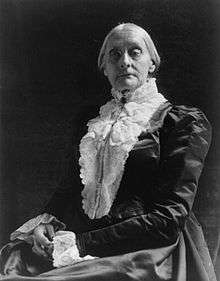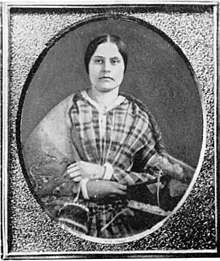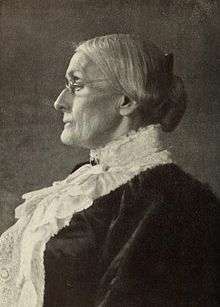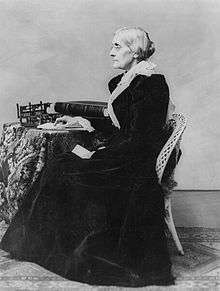
We assert the province of government to be to secure the people in the enjoyment of their unalienable rights. We throw to the winds the old dogma that governments can give rights.
Susan Brownell Anthony (15 February 1820 – 13 March 1906) was a prominent, independent and well educated American civil rights leader who, along with Elizabeth Cady Stanton, led the effort to secure Women's suffrage in the United States.
Quotes

Those who are really in earnest must be willing to be anything or nothing in the world's estimation.
_(14598131198).jpg)
Woman must not depend upon the protection of man, but must be taught to protect herself

I want you to understand that I never could have done the work I have if I had not had this woman at my right hand.
- The true woman will not be exponent of another, or allow another to be such for her. She will be her own individual self, — do her own individual work — stand or fall by her own individual wisdom and strength stand or fall by her own individual wisdom and strengh... She will proclaim the "glad tidings of good news" to all women, that woman equally with man was made for her own individual happiness, to develop every power of her three fold-nature, to use, worthily every talent given to her by God, in the great work of life.
- Statement of Anthony and Elizabeth Cady Stanton (1856), partially quoted in The Right to Vote (2001) by Claudia Isler, p. 50, and in Perfecting the Family : Antislavery Marriages in Nineteenth-Century America (1997) by Chris Dixon, p. 144
- The men and women of the North are slaveholders, those of the South slaveowners. The guilt rests on the North equally with the South.
- Speech on No Union with Slaveholders (1857)
- Cautious, careful people, always casting about to preserve their reputation and social standing, never can bring about a reform. Those who are really in earnest must be willing to be anything or nothing in the world's estimation.
- On the Campaign for Divorce Law Reform (1860)
- Many Abolitionists have yet to learn the ABC of woman's rights.
- Journal (June 1860)
- I do not demand equal pay for any women save those who do equal work in value. Scorn to be coddled by your employers; make them understand that you are in their service as workers, not as women.
- The Revolution, Women's Suffrage Newspaper (8 October 1868)
- Join the union, girls, and together say Equal Pay for Equal Work.
- The Revolution (18 March 1869)
- Woman must not depend upon the protection of man, but must be taught to protect herself.
- Speech in San Francisco (July 1871)
- I shall work for the Republican party and call on all women to join me, precisely... for what that party has done and promises to do for women, nothing more, nothing less.
- Letter to Elizabeth Cady Stanton (Autumn 1872)
- Here, in the first paragraph of the Declaration [of Independence], is the assertion of the natural right of all to the ballot; for how can "the consent of the governed" be given, if the right to vote be denied?
- On the United States Declaration of Independence in her "Is It a Crime for a Citizen of the United States to Vote?" speech before her trial for voting (1873)
- We no longer petition legislature or Congress to give of the right to vote, but appeal to women everywhere to exercise their too long neglected "citizen's right" … We assert the province of government to be to secure the people in the enjoyment of their unalienable rights. We throw to the winds the old dogma that governments can give rights. The Declaration of Independence, the United States Constitution the constitutions of the several states … propose to protect the people in the exercise of their God-given rights. Not one of them pretends to bestow rights. … One half of the people of this Nation today are utterly powerless to blot from the statute books an unjust law, or to write a new and just one. The women, dissatisfied as they are with this form of government, that enforces taxation without representation — that compels them to obey laws to which they have never given their consent — that imprisons and hangs them without a trial by a jury of their peers — that robs them, in marriage of the custody of their own persons, wages, and children—are this half of the people left wholly at the mercy of the other half.
- Address given in towns of Ontario county, prior to her trial, quoted in "An account of the proceedings on the trial of Susan B. Anthony, on the charge of illegal voting, at the presidential election in Nov. 1872, and on the trial of Beverly W. Jones, Edwin T. Marsh and William B. Hall, the inspectors of election by whom her vote was received." (1873); also quoted in Great American Trials: 201 Compelling Courtroom Dramas (1994) by Edward W. Knappman, p. 167
- Marriage, to women as to men, must be a luxury, not a necessity; an incident of life, not all of it. And the only possible way to accomplish this great change is to accord to women equal power in the making, shaping and controlling of the circumstances of life.
- Speech on Social Purity (Spring 1875)
- I want you to understand that I never could have done the work I have if I had not had this woman at my right hand.
- Regarding Elizabeth Cady Stanton in Woman's Tribune (22 February 1890)
- The older I get, the greater power I seem to have to help the world; I am like a snowball — the further I am rolled the more I gain.
- The Life and Work of Susan B. Anthony: Including Public Addresses, Her Own Letters and Many from Her Contemporaries During Fifty Years, Volume 2 (1 January 1898) by Ida Husted Harper, published by Bowen-Merrill Company
- The one distinct feature of our Association has been the right of the individual opinion for every member. We have been beset at every step with the cry that somebody was injuring the cause by the expression of some sentiments that differed with those held by the majority of mankind. The religious persecution of the ages has been done under what was claimed to be the command of God. I distrust those people who know so well what God wants them to do to their fellows, because it always coincides with their own desires.
- A defense of Elizabeth Cady Stanton against a motion to repudiate her Woman's Bible at a meeting of the National-American Woman Suffrage Association 1896 Convention, HWS, IV (1902), p. 263
- Failure is impossible.
- At her eighty-sixth birthday celebration (15 February 1906)
- Every discrimination against women in the constitutions and laws of the several States is today null and void, precisely as in every one against Negroes.
- Woman's Rights to the Suffrage Speech (1873)
- On bicycling: "I think it has done more to emancipate women than anything else in the world. I stand and rejoice every time I see a woman ride by on a wheel. It gives woman a feeling of freedom and self-reliance. It makes her feel as if she were independent. The moment she takes her seat, she knows she can't get into harm unless she gets off her bicycle, and away she goes, the picture of free, untrammelled womanhood." On teaching: "In those days, we did not know any other way to control children. We believed in the goodness of not sparing the rod. As I got older, I abolished whipping. If I couldn't manage a child, I thought it my ignorance, my lack of ability, as a teacher. I always felt less the woman when I struck a blow." "I must have an audience to inspire me ... to save my life, I couldn't write a speech". "It all rose out of the men refusing to let me speak" at a temperance meeting. "Women were the bond slaves of men". "I know God never made a woman to be bossed by a man". "The law says that only idiots, lunatics and criminals shall be denied the right to vote. So you see with whom all women are classed." "When two people take each other on terms of perfect equality, without the desire of one to control the other to make the other subservient, it is a beautiful thing. It is the truest and highest state of life." "I never felt I could give up my life of freedom to become a man's housekeeper and drudge. ... Once men were afraid of women with ideas and a desire to vote. Today, our best suffragists are sought in marriage by the best class of men."
- Interview with Nellie Bly, New York World, 2 February 1896, p. 10.
Trial on the charge of illegal voting (1874)
_(14758097676).jpg)
My every right, constitutional, civil, political and judicial has been tramped upon.
- I have many things to say. My every right, constitutional, civil, political and judicial has been tramped upon. I have not only had no jury of my peers, but I have had no jury at all.
- Account of Matilda Joslyn Gage (20 June 1873) to Kansas Leavenworth Times (3 July 1873)
- The only chance women have for justice in this country is to violate the law, as I have done, and as I shall continue to do.
- Account of Matilda Joslyn Gage (20 June 1873) to Kansas Leavenworth Times (3 July 1873)
- I do not ask the clemency of the court. I came into it to get justice, having failed in this, I demand the full rigors of the law.
- Account of Matilda Joslyn Gage (20 June 1873) to Kansas Leavenworth Times (3 July 1873)
- Even, under such circumstances, a commoner of England, tried before a jury of Lords, would have far less cause to complain than should I, a woman, tried before a jury of men.
- An Account of the Proceedings on the Trial of Susan B. Anthony on the Charge of Illegal Voting] (1874)
- But, yesterday, the same man-made forms of law, declared it a crime punishable with $1,000 fine and six months' imprisonment, for you, or me, or any of us, to give a cup of cold water, a crust of bread, or a night's shelter to a panting fugitive as he was tracking his way to Canada. And every man or woman in whose veins coursed a drop of human sympathy violated that wicked law, reckless of consequences, and was justified in so doing.
- An Account of the Proceedings on the Trial of Susan B. Anthony on the Charge of Illegal Voting] (1874)
- May it please your honor, I shall never pay a dollar of your unjust penalty. All the stock in trade I possess is a $10,000 debt, incurred by publishing my paper — The Revolution — four years ago, the sole object of which was to educate all women to do precisely as I have done, rebel against your man-made, unjust, unconstitutional forms of law, that tax, fine, imprison and hang women, while they deny them the right of representation in the government; and I shall work on with might and main to pay every dollar of that honest debt, but not a penny shall go to this unjust claim. And I shall earnestly and persistently continue to urge all women to the practical recognition of the old revolutionary maxim, that "Resistance to tyranny is obedience to God."
- On her $100 fine, as quoted in An Account of the Proceedings on the Trial of Susan B. Anthony on the Charge of Illegal Voting] (1874) The "old revolutionary maxim" Anthony uses here has been variously attributed to William Tyndale, Benjamin Franklin, and Thomas Jefferson, as well as to herself.
- Variant: Resistance to tyranny is obedience to God; I shall never pay a penny of this unjust claim.
- As quoted in Woman: Her Position, Influence and Achievement Throughout the Civilized World (1900) p. 415
- Unsourced variants: Resistance to tyranny is obedience to God, and I shall never pay a penny of this unjust claim.
Resistance to tyranny is obedience to God, and I shall never pay a penny of this unjust fine.
Misattributed
- Resistance to tyranny is obedience to God.
- This statement was widely used as an abolitionist and feminist slogan in the 19th century and has sometimes been attributed to Anthony, who famously used it, but cited it as an "old revolutionary maxim"; it has also frequently been attributed to Thomas Jefferson, and to Benjamin Franklin, who has been cited as having proposed it as the motto of the United States, as well as to English theologian William Tyndale. The earliest definite citations of a source yet found in research for Wikiquote indicates that it was declared by Massachusetts Governor Simon Bradstreet after the overthrow of Dominion of New England Governor Edmund Andros in relation to the "Glorious Revolution" of 1688, as quoted in Official Report of the Debates and Proceedings in the State Convention: assembled May 4th, 1853 (1853) by the Massachusetts Constitutional Convention, p. 502. It is also quoted as a maxim that arose after the overthrow of Andros in A Book of New England Legends and Folk Lore (1883) by Samuel Adams Drake. p. 426
- No matter what the motive, love of ease, or a desire to save from suffering the unborn innocent, the woman is awfully guilty who commits the deed. It will burden her conscience in life, it will burden her soul in death, but oh, thrice guilty is he who, for selfish gratification, heedless of her prayers, indifferent to her fate, drove her to the desperation that impelled her to the crime!
- Anonymous essay signed "A" in The Revolution, August 8, 1869. Often attributed to Susan B. Anthony, who was the owner of the newspaper. Ann Dexter Gordon, PhD, leader of a research project at Rutgers University which has examined 14,000 documents related to Anthony and Stanton, writes that "no data exists that Anthony ... ever used that shorthand for herself", and that the essay presents material which clashes with Anthony's "known beliefs".
External links
- The Life and Work of Susan B. Anthony (Volume 1 of 2), by Ida Husted Harper, from Project Gutenberg
This article is issued from
Wikiquote.
The text is licensed under Creative
Commons - Attribution - Sharealike.
Additional terms may apply for the media files.

